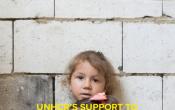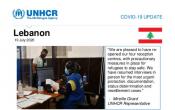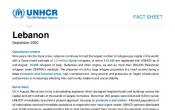Lebanon
Operation: Lebanon
Location
{"longitude":36,"latitude":34,"zoom_level":8,"iso_codes":"'LBN'"}
By clicking on the icons on the map, additional information is displayed.
The boundaries and names shown and the designations used on this map do not imply official endorsement or acceptance by the United Nations.
Key Figures
| 2019 year-end results | |
| 900,000 | individuals received direct cash transfers with a total value of over $156 million |
| 260,000 | refugee and Lebanese families benefitted from winter assistance |
| 181,400 | vulnerable refugees benefitted from improved living conditions through shelter interventions |
| 131,400 | people accessed community centres, mostly for information desks, awareness sessions and skills trainings |
| 65,400 | hospital referrals were made for lifesaving and obstetric interventions (60% of which were deliveries) |
| 32,800 | refugee families received monthly multipurpose cash grants |
| 2020 planning figures |
| 100,800 | of the most economically vulnerable Syrian refugee families and 2,900 refugee and asylum-seeker families of other nationalities gain multi-purpose cash assistance |
| 100,000 | Syrian refugees and 1,000 refugees and asylum-seekers of other nationalities access subsidized secondary and tertiary medical care |
| 53,000 | Syrian refugees and 1,100 refugees and asylum-seekers of other nationalities benefit from civil status registration or documentation |
| 44,000 | Syrian refugees and 3,000 refugees and asylum-seekers of other nationalities receive counselling and legal aid on legal residency procedures and other protection issues |
| 8,000 | Syrian refugees and 900 refugees of other nationalities are submitted for resettlement |
Latest Updates and Related Links
People of Concern
3%
Decrease in
2019
2019
| 2019 | 936,164 |
| 2018 | 969,641 |
| 2017 | 1,018,416 |

[["Refugees",916156],["Asylum-seekers",12123],["Others of concern",7885]]
Loading ...
Lebanon
< Back
2019
{"categories":[2015,2016,2017,2018,2019,2020],"budget":[481.69591013300004,463.42199479699997,464.49368312800004,463.03522447999995,562.76097942,607.51645697],"expenditure":[318.76293313,350.84684490999996,325.81702766999996,313.71449307,325.72717125,null]}
{"categories":[2015,2016,2017,2018,2019,2020],"p1":[480.45363506300004,462.446930787,463.88738601800003,462.4443182,562.0079341100001,606.50782397],"p2":[1.24227507,0.97506401,0.60629711,0.59090628,0.7530453100000001,1.008633],"p3":[null,null,null,null,null,null],"p4":[null,null,null,null,null,null]}
{"categories":[2015,2016,2017,2018,2019,2020],"p1":[318.55729707999996,350.04193388,325.26760783,313.24121253,325.05891393,null],"p2":[0.20563605,0.8049110300000001,0.54941984,0.47328053999999997,0.6682573199999999,null],"p3":[null,null,null,null,null,null],"p4":[null,null,null,null,null,null]}
Loading ...
CHOOSE A YEAR
- 2014
- 2015
- 2016
- 2017
- 2018
- 2019
- 2020
Operational context
The protracted refugee presence remained a primary topic in political and public discourse in Lebanon, with references regularly being made to the impact particularly on the economy, unemployment and the environment.In mid-April 2019, the decisions to apply laws and regulations in respect of Syrians in a stricter manner led to instructions to dismantle unauthorized shelter structures, to consider deportation for Syrians who had entered Lebanon irregularly after 24 April 2019, and to enforce the permit requirements for foreign workers. UNHCR advocated for the decisions to be interpreted in a non-discriminatory manner, with respect for due process, averting and mitigating the implementation of some measures. UNHCR continued to urge the Government to apply the procedural safeguards in the national law to deportation cases to prevent refoulement.
UNHCR was aware of around 24,000 refugees returning to the Syrian Arab Republic (Syria) on their own or in group movements facilitated by the General Security (a 44% increase compared to 2018). Where possible, UNHCR supported refugees with civil documentation, information on services available in Syria, and vaccinations. The main reasons cited for return included reunification with family in Syria, improved security in their place of return, and their socio-economic situation in Lebanon. However, there was concern about the impact of the economic crisis in Lebanon on the economy inside Syria, and its potential to further jeopardize the sustainability of returns.
As the economic crisis in Lebanon became more tangible, nationwide protests calling for government reform led to the resignation of the Government in October. The ensuing inflation and loss of jobs visibly increased poverty among both Lebanese and refugees and contributed to a rise in evictions due to inability to pay rent, demonstrations by refugees outside UNHCR offices calling for third country resettlement and humanitarian assistance, as well as mental health concerns. Greater competition over basic resources, coupled with the absence of a social safety net for poor Lebanese added to the intercommunal tensions that had been rising for years. In order to mitigate tensions and preserve the protection space in host communities, UNHCR expanded its winter assistance program to include a component for vulnerable Lebanese.
Despite these challenges, Lebanon was well-represented at the Global Refugee Forum in December 2019, and submitted several pledges, including a reaffirmation of important commitments made at the Brussels Conferences.
Population trends
The Government estimated that it was host to 1.5 million Syrian refugees in 2019. Some 914,600 Syrian refugees were registered with UNHCR in Lebanon at the end of 2019 - a decrease of nearly 4% from 2018.The number of refugees and asylum-seekers from countries other than Syria registered with UNHCR reached nearly 18,000 by the end of 2019, a decrease of just over 1% during the year.
During the year, some 10,900 refugees were submitted for resettlement and nearly 8,400 refugees departed to third countries.
Achievements
- UNHCR maintained and continuously updated its database and close to 681,500 individual files were verified and updated.
- Advocacy and technical support resulted in policy changes to facilitate the registration of children born to Syrian parents in Lebanon, resulting in a 10% increase in the number of births registered compared to the previous year.
- Community engagement increased information sharing within refugee communities, as well as the identification and referral of people with protection and assistance needs. In 2019, every hour, 4,496 refugees were counseled or received information and feedback on protection and assistance services.
- UNHCR’s education programme contributed to the 6% increase in enrolment of refugee children in basic education. The programme benefited from the support of more than 150 refugee volunteers who disseminated information, referred out-of-school children and provided solutions for education-related problems.
- For the Global Refugee Forum, UNHCR and the Lebanese Government produced a joint brochure on Lebanon’s good practices under the Global Compact on Refugees, and important pledges were made by the Government, civil society network and faith-based actors on policy and practice as well as evidence-based dialogue.
Unmet needs
- No decision was taken by the Government to expand the fee waiver for temporary residence permits for refugees. The number of refugees with valid residency consequently decreased, impacting their ability to move freely without risking arrest and detention. Conversely, the General Security authorized UNHCR to accompany refugees when submitting residency applications, enabling hundreds of refugees to renew their temporary permits.
- With the operation funded at only 58% in 2019, less than half of severely vulnerable Syrian refugee families received monthly multipurpose cash due to the shortage of funding compared to comprehensive needs. Similarly, UNHCR was not able to assist all refugee families of other nationalities living below the poverty line. Annual vulnerability assessments showed increasing poverty and higher indebtedness, which in turn led to an increase in vulnerability to exploitation and negative coping strategies.
- With increasing unemployment and poverty among both refugees and Lebanese, intercommunal tensions increased due to competition over scarce resources. The resources available to mitigate the impact of the refugee presence on services, local infrastructure and livelihoods were insufficient to address critical needs.
Operational Environment
Lebanon remains the country hosting the largest number of refugees per capita, with Government estimate of 1.5 million Syrian refugees, some 20,000 refugees of other origins, in addition to the Palestine refugees under UNRWA’s mandate.Lebanon has contributed immensely to the response by giving refugees equal access to the public schools, hospitals and social development centres. However, the econmic crisis in the country, high pressure on services and infrastructure including solid waste, competition over jobs and other factors are trying the patience and hospitality of the host community.
The multi-partnership Lebanon Crisis Response Plan (LCRP) 2017-2020 provides a framework for an integrated humanitarian-development response in which the needs of the refugees are – to the extent possible based on national laws and policies – met by strengthening the capacity of national institutions and local civil society organizations to deliver services, and thereby the impact of the refugee presence is mitigated through support to host communities and vulnerable Lebanese. At the same time, it is essential for UNHCR and its partners to maintain a robust, complementary humanitarian response given the Government’s policy against longer-term stay and the consequential limitations on refugees’ ability to secure an income to meet basic needs such as rent, food and medicate care, coupled with protection risks such as arrests and SGBV stemming from limited access to legal residency and documentation, as well as adequate housing.
UNHCR anticipates that the vulnerabilities of Syrian and non-Syrian refugees are likely to further increase due to cumulative factors in this protracted situation, where refugees will remain largely dependent on humanitarian assistance to meet their basic needs and stay resilient against exploitation, evictions and other risks.
Key priorities
In 2019, UNHCR will focus on:- Continuing to work closely with the Lebanese Government, UN, civil society and private sector partners – in a whole of society approach and within the established coordination structure – to support refugees’ ability to preserve their well-being and dignity and the Lebanese communities hosting them, while UNHCR pursues durable solutions outside the country. This will be done through complementary activities ranging from the identification of individual and collective protection risks and advocacy as well as legal and social aid to address these, to support to the Lebanese institutions to increase their capacity to provide the necessary services to refugees and vulnerable Lebanese.
- Ensuring access to protection and non-refoulement by providing legal counselling and institutional support to facilitate the issuance of temporary residence permits and civil status documents, and advocacy related to due process guarantees.
- Providing multi-purpose cash assistance to the most severely vulnerable refugees and subsidize lifesaving and emergency hospitalizations for refugees with critical medical needs. The youth will be a prioritised group for educational and life skills activities to develop their human capital and resilience.
- Expanding opportunities for third country resettlement and complementary pathways, and continuing ongoing efforts to address the factors that refugees highlight as currently preventing their voluntary return to Syria in safety and dignity. At the same time, UNHCR will continue helping those wishing to return now to obtain key civil documents, such as birth registration, to facilitate their re-establishment back home.
























